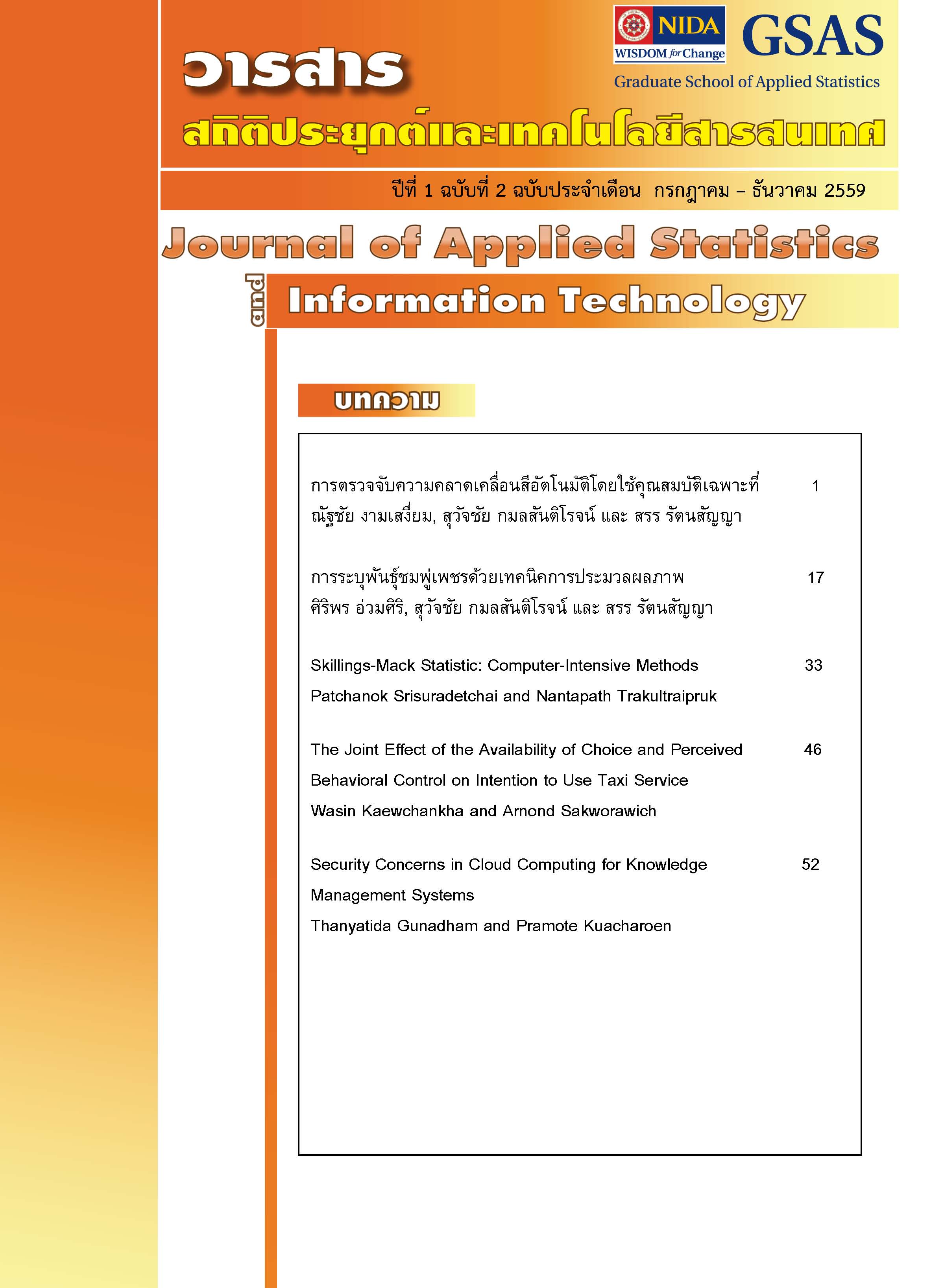The Joint Effect of the Availability of Choice and Perceived Behavioral Control on Intention to Use Taxi Service
Keywords:
Availability of Choice, Perceived Behavioral Control, Behavioral Intention, Taxi Service, Gender DifferencesAbstract
People usually prefer to more choices and stronger sense of control. However, the result of this study clearly found that perceived behavioral control is much more important than availability of choice to predict intention to use. Specifically, consumers with lower level of perceived behavioral control will even exhibit lower level of behavioral intention if they possess more availability of choice than less choice. Moreover, we also found that male consumers exhibit higher behavioral intention than female when they possess higher perceived behavioral control. The roles of control and choice in service marketing are discussed
References
2. Ajzen, I.: Perceived Behavioral Control, Self-efficacy, Locus of Control, and the Theory of Planned Behavior. Journal of Applied Social Psychology. 32(4), 665–683 (2002)
3. Albarracin, D., Johnson, B., Fishbein, M., Muellerleile, P.: Theories of Reasoned Action and Planned Behavior as Models of Condom Use: A Meta-analysis. Psychological Bulletin. 127(1), 142–161 (2001)
4. Sheeran, P. & Taylor, S.: Predicting Intentions to Use Condoms: A Meta-analysis and Comparison of the Theories of Reasoned Action and Planned Behavioral. Journal of Applied Social Psychology. 29(8) 1624–1675 (1999)
5. Oygard, L., Rise, J.: Predicting the Intention to Eat Healthier Food among Young Adults. Health Education Research. 11(4), 453–461 (1996)
6. Nguyen, N., Potvin, L., Otis, J.: Regular Exercise in 30 to 60 Year Old Men: Combining the Stages of Change Model and the Theory of Planned Behavior to Identify Determinants for Targeting Heart Health Interventions. Journal of Community Health. 22(4), 233–246 (1997)
7. Iyengar, S., Lepper, M.: When Choice is Demotivating: Can One Desire Too Much of a Good Thing. Journal of Personality and Social Psychology. 79(6), 995–1000 (2000)
8. Hadar, L., Sood, A.: When Knowledge Is Demotivating: Subjective Knowledge and Choice Overload. Psychological Science. 25(9), 1739–1747 (2014)
9. Samuelson, P. & Nordhaus, W.: Economics. 9 ed. McGraw Hill, Singapore (2010)
10. Bakker, B., Buunk, P., Siero, W.: Condom Use among Heterosexuals: A Comparison of the Theory of Planned Behavior: The Health Belief Model and Protection Motivation
Theory. Department of Social and Organizational Psychology, University of Groningen, Netherlands (1996)
11. Fisher, A., Fisher, D., Rye, B.: Understanding and Promoting AIDS Preventive Behavior: Insights from the Theory of Reasoned Action. Health Psychology. 14, 255–264 (1995)
12. Gallois, C., Kashinia, Y., Terry, D., McCamish, M., Timmins, P., Chauvin, A.: Safe and Unsafe Intentions and Behavior: The Effects of Norms and Attitudes. Journal of Applied Social Psychology. 22, 1521–1545 (1992)
13. Wilson, D., Zenda, A., McMaster, J., Lavelle, S.: Factors Predicting Zimbabwean Students' Intentions to Use Condoms. Psychology and Health. 7, 99–114 (1992)
14. Baron, R. M., Kenny, D. A.: The Moderator-mediator Variable Distinction in Social Psychological Research: Conceptual, Strategic, and Statistical Considerations. Journal of Personality and Social Psychology. 51(6), 1173–1182 (1986)
15. Aiken, S. & West, G.: Multiple Regression: Testing and Interactions. Sage Publications, London (1991)
16. Cohen, P., Cohen, J., West, G., Aiken, S.: Applied Multiple Regression/Correlation Analysis for the Behavioral Sciences. 3 ed. Mahwah, Lawrence Erlbaum, NJ (2002)
17. Folkman, S., Lazarus, R.: If It Changes It Must Be a Process: Study of Emotion and Coping during Three Stages of a College Examination. Journal of Personality and Social Psychology. 48(1), 150–170 (1985)
18. Folkman, S., Lazarus, R.: Coping As a Mediator of Emotion. Journal of Personality and Social Psychology. 48(3), 466–475 (1988)
Downloads
Published
How to Cite
Issue
Section
License
เนื้อหาและข้อมูลที่ปรากฏในบทความที่ตีพิมพ์ในวารสารสถิติประยุกต์และเทคโนโลยีสารสนเทศถือเป็นความคิดเห็นส่วนบุคคลของผู้เขียนแต่ละท่าน ความผิดพลาดของข้อความและผลที่อาจเกิดจากนำข้อความเหล่านั้นไปใช้ผู้เขียนบทความจะเป็นผู้รับผิดชอบแต่เพียงผู้เดียว บทความ ข้อมูล เนื้อหา รูปภาพ ฯลฯ ที่ได้รับการตีพิมพ์ในวารสารถือเป็นลิขสิทธิ์ของวารสาร หากบุคคลหรือหน่วยงานใดต้องการนำทั้งหมดหรือส่วนหนึ่งส่วนใดไปเผยแพร่ต่อหรือเพื่อกระทำการใดๆ จะต้องได้รับอนุญาตเป็นลายลักอักษรณ์จากวารสาร ก่อนเท่านั้น



